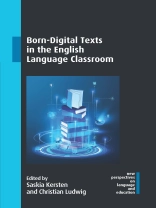This book is the first to focus specifically on born-digital texts in EFL teaching, uniting international and innovative scholarship with practical classroom applications. The book develops a theoretically sound framework for curriculum, materials and methods design that takes into account the growing ubiquity of born-digital texts in the digital age. It covers a broad variety of born-digital text types (including those generated by AI) which so far have not been an explicit focus in the context of language teaching, while also providing a grounding in current discussions around digital tools in education. The chapters cover a wide range of issues from methodological approaches to born-digital texts to curriculum, syllabus and materials design. The book will be a valuable introduction to the subject for trainee and practising teachers, as well as teacher educators and students on EFL courses.
Chapter 7 is free to download as an open access publication under a CC BY licence and is available here: https://zenodo.org/records/11174197.
Inhaltsverzeichnis
Acknowledgements
Chapter 1. Daniel Becker, Saskia Kersten, Christian Ludwig, Peter Schildhauer and Sandra Stadler-Heer: Born-Digital Text in English Language Teaching: The State of Play
Chapter 2. Saskia Kersten: The Linguistics of Born-Digital Texts
Chapter 3. Kathy A. Mills: What Counts as Language Learning in a Born-Digital Textual World?
Chapter 4. Celestine Caruso, Judith Hofmann and Kim Schick: Born-Digital Texts and Digitally Mediated Tasks: A Perfect Match for the Inclusive EFL Classroom?
Chapter 5. Ralf Gießler and Daniel Becker: #hashtagsareforlearning – Hashtags as Digital Texts and their Affordances in the EFL Classroom
Chapter 6. Peter Schildhauer and Katharina Kemper: Towards a Critical Digital Literacy Framework: Exploring the Impact of Algorithms in the Creation of Filter Bubbles on Instagram
Chapter 7. Valentin Werner: Exploring the Potential of Live Text for ELT
This chapter is open access under a CC BY licence and can be downloaded for free at: https://zenodo.org/records/11174197
Chapter 8. Janina Reinhardt: From Gaming to Linguistic Action: Let’s Play Videos as (More Than) Mediation Tasks
Chapter 9. Sandra Stadler-Heer: Consuming and Producing Artificial Intelligence (AI)-Generated Text in English Language Classrooms
Chapter 10. Jasmina Najjar and Philip M. Mc Carthy: AI and the Digital Writing Process
Chapter 11. Christopher Rwodzi and Lizette J. De Jager: Learning English as a Second Language through Born-Digital Texts on Social Media in South Africa
Chapter 12. Maya Ashooh, Alecia Marie Magnifico and Bethany Silva: “I’m going to teach differently”: Changing Perceptions of Writing Instruction through Digital Text Creation
Chapter 13. Tara Mc Ilroy: Fanfiction Experiences of Japanese Students: Connecting Wild Reading and L2 Learning
Chapter 14. Carolin Zehne: The Potential of Location-Based Technologies and Mobile-Assisted Language Learning for ELT
Chapter 15. Jeanine Steinbock: Alice for the i Pad: Digital Storybook Apps in the EFL Classroom
Chapter 16. Christian Ludwig, Michaela Sambanis and Georg Hartisch: #Literature Goes Digital: Digital Transformations in the ELT Literature Classroom
Index
Über den Autor
Christian Ludwig is currently visiting Professor at the Freie Universität Berlin, Germany. His research interests include literature and digital tools in language teaching as well as applying positive psychology in school settings.












